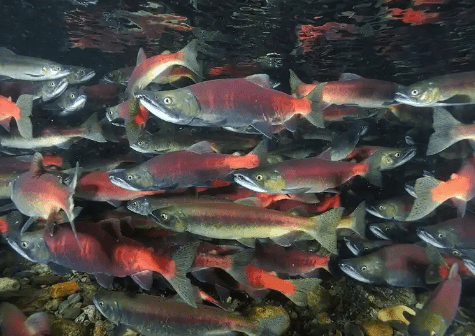Yukon River – Interesting Facts You Should Know
Yukon River is said to be the major water-course in North America (Northwest).
The river has its source from British Columbia, Canada.
In this article, we’ll be discussing a whole lot about the Yukon River so stay tuned!
According to our research, the water is said to have a total area that is 25% larger than Texas and Alberta.
Where is the Yukon River located? The Yukon river is simply located at Atlin District, British Columbia, Canada.
The river was mainly used as a means of transportation of foreign and domestic goods for economical purposes through ships.
The Yukon river however wouldn’t be so magnificent if not for some of its basic features, which include its tributaries.
Read Also: Mississippi River Stages: All You Need to Know About
The Yukon river tributaries are divided into two, mainly left and right tributaries, the tributaries at the right includes;
(1) White river
(2) Tanana river
(3) Innoko river, etc.
The tributaries at the right include;
(1) Tagish river
(2) Takhini river
(3) Tashi river
(4) Big salmon river
(5) Pelly river
(6) Stewart river
(7) Wondike river
(8) Birch Creek
(9) Koyukuk river, etc.
Note: Tributaries are smaller rivers that join to form bigger rivers.
Like we have been discussing several magnificent rivers for the past few weeks, we made mention that water pollution is constant and the Yukon river is not left out, as it has a history of pollution from military installations, dumps, waste-waters, and other sources.
The river simply has a higher suspended sediment concentration.
The Yukon river over the years has chosen to stand out, amongst other existing rivers, in terms of agricultural activities, one of which is the fishery aspect.
The river is a great source of Salmon. Salmon fishes are nice and delicious fish and are rich in meat and also oily.

The salmon fish can be handled in a variety of different ways;
(1) Drying
(2) Smoking
(3) By freezing, etc.
The settlements around the river basin, rely mostly on salmon for cultural and commercial needs.
You now know how great this river is, although one can’t just thread the Yukon river and start fishing without going through relevant authorities for clearance.
The reason is that the traditional agency and other agencies associated with the Yukon river are seriously working to preserve and sustain the Yukon river salmon, to promote healthy people, cultures, and communities.
Read Also: Missouri River – All you need to know about
Facts about Yukon River
Some of the Yukon river facts include;
(1) The highest mountain in Canada is located in Yukon.
(2) The Yukon was named after a river, through the Yukon River.
(3) The Yukon is known for its interest in sled-dog racing.
(4) How long is the Yukon River? The Yukon river is said to be longer than Mississippi, the river has approximately 129,500 square kilometers in size.
(5) The river is the longest in Alaska, and also the third-longest river in North America.
(6) The Yukon river is said to be a major watercourse of North America (Northwest).
Note: The name Yukon was derived from the Gwich’in language, which means “Great River”.
The Yukon river has a total of 3,190km that is 1,982miles and the home to one of the longest salmon runs in the world.
The Yukon is one of the best tourist attractions, this is because of its fascinating and exquisite landscape.
Yukon River Map

According to the Yukon river map, the Yukon River starts in British Columbia, Canada, and ends on the Bering sea.
We won’t be discussing the Yukon river on map any further, since it’s broad, however, take a look at the map below;
Note: the river is dangerous, due to so many reasons (intake section of the river).
Read Also: Water: How much should you drink every day
Yukon River Quest
The Yukon river quest is an annual marathon paddling race. This quest is being made to test their endurance.
The race is 715km/454miles on the Yukon River from Whitehorse to Dawson City.
The race mainly consists of checkpoints along the route including two mandatory stops.
Teams are expected to spend 7 hours paddling in Carmack and 3 hours in Coffee Creek, that’s why we said it is a test of endurance.
Yukon River Run
We can’t discuss Yukon in general without mentioning the Yukon river run.
This is an American reality TV series, produced for the National Geographic Channel, the show is quite interesting.
Also as the Yukon nears the Bering Sea, it bends sharply northward to empty into Norton Sound.
The river delta is about 40 miles (65 km) across, swampy, and lake-covered. Many of the distributory channels are shallow, but the northeastern one, Apoon Pass, was once used by riverboats.
The Yukon basin is one of the most populated and least developed regions in North America.
The main resource of the Yukon basin is its scenery, isolation, and sparse population, all of which are attractive to tourists seeking to escape the more crowded and less scenically endowed areas of the continent.
More Interesting facts about the Yukon river
- Yukon River was one of the main waterways during the Klondike Gold Rush through which people traveled.
- Teslin River, Pelly River, White River, and Stewart River are four principal tributaries that feed this river.
- Starting in British Columbia this river ends in Alaska. Eventually, it empties into the Bering Sea.
- It is also home to Whitehorse Fishway which is the longest wooden fish ladder in the world.
- The Yukon River Quest is the longest annual canoe and kayak race in the world at 715 kilometers.
- Some large lakes that are part of this river system are Lake Laberge, Kusawa Lake, and Kluane Lake.
- The name Yukon has been derived from the Gwich’in language that means Great River.
- The Yukon–Kuskokwim Delta is a river delta located where the Yukon and Kuskokwim rivers empty into the Bering Sea.
- The drainage basin of the river is the fourth largest in North America.
Yukon weather has been known to be quite variable as an Arctic air mass can dominate one day, and the next day a warm front can move in from the Pacific.
Read Also: Stardew Valley Tilapia: Where to Catch them, their Uses, etc.



